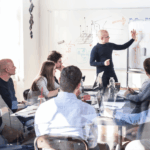The Academic Startup Competition (ASC) 2025, held at Eindhoven University of Technology, celebrated the achievements of innovative startups in academia. Ten promising startups were recognized for translating academic research into practical solutions targeting issues in health, sustainability, and technology. This event gathered industry experts, academics, government representatives, and investors to explore how academic startups can address pressing societal and technological challenges.
In past editions, awards often went to startups focusing on digital technology and renewable energy. This year, the emphasis seemed to shift towards biotechnology and quantum science, showcasing evolving priorities in academic entrepreneurship. The involvement of global networks like the international program in the US reveals an increased focus on preparing startups for international markets, a consistent trend observed in previous editions of the Academic Startup Competition.
Who Stood Out?
The success stories from this edition included notable startups such as ATA Mute BV, known for its noise reduction solutions in technical systems. IMChip, another highlighted startup, aims to make strides in AI hardware with its energy-efficient neuromorphic chips designed for various applications. Simultaneously, MycoFarming uses mycofiltration for agricultural sustainability, underscoring a significant interest in eco-friendly technological solutions.
What’s Developing in Biotechnology?
The biotechnology realm witnessed groundbreaking ideas with startups like VirXcel BV and MycoFarming pushing boundaries. VirXcel BV is focused on developing a nasal spray to combat respiratory viruses, providing a new approach to viral treatment, crucial amidst health challenges. Meanwhile, MycoFarming’s mycofiltration process offers an innovative path to alleviate nitrogen pollution, supporting reduced CO2 emissions in agriculture.
The ASC initiative, a national effort, aids Dutch academic startups from inception to scale. Since 2018, it has involved partnerships with organizations such as ScaleNL and the Ministry of Economic Affairs and Climate. Providing teams with training, networking, and experts’ input has been a keystone for participants’ growth. Over 150 startups, such as IamFluidics, have previously benefited, highlighting its impact on the startup landscape.
“The programme’s ability to connect startups with international networks is critical for their growth,”
emphasized an industry insider familiar with ASC’s goals. The comprehensive program not only focuses on innovation but also on preparing these startups for successful commercial endeavors.
As future editions unfold, broader participation and increased cross-disciplinary innovations are anticipated. While technological advancement and sustainability remain priorities, there’s an expectation for increased involvement in biotechnology and health sciences. These focus areas mirror global trends where interdisciplinary approaches to solve pressing issues are gaining traction. Observers expect the ASC to continue highlighting diverse talents across academic institutions.










